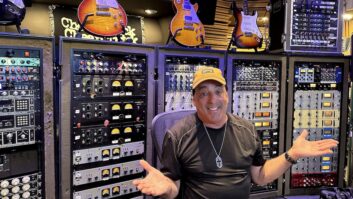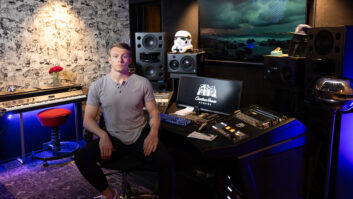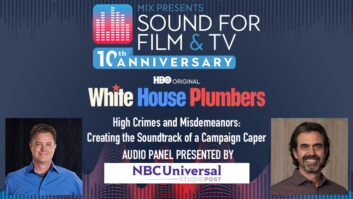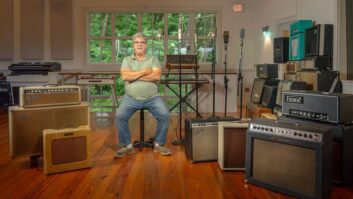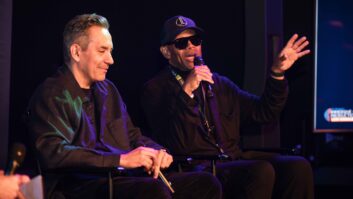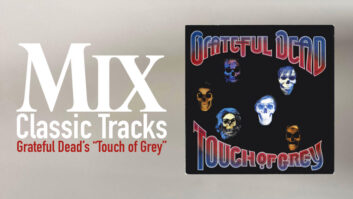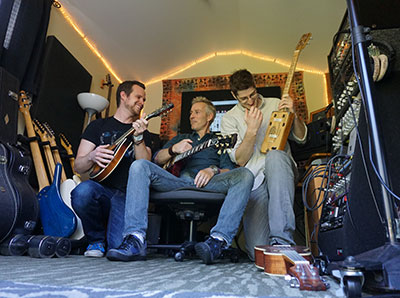
A motion picture’s music score is rarely, if ever, licensed for use in the film’s trailer. Indeed, it rarely ever was; more likely it was recycled from other films. Those enormous, epic themes, pounding rhythms and lush, melodic underscore that you hear during the Coming Attractions? You won’t hear them in the film.
Over the past couple of decades, promoting a movie has become a specialized business. These days, film production companies employ trailer houses to put together promotional campaigns for cinema, television and the Internet. They, in turn, commission custom music from composers who are adept at crafting scores that are as much about selling theater tickets as they are about selling the emotion of a scene.
One such custom music shop is The Hit House, established 10 years ago by Sally House, the company’s executive director, and her husband, creative director Scott Miller. With a background in advertising and branding in South Africa, House initially worked at ad agency Ogilvy & Mather after moving to Los Angeles, later transitioning to the client side as Kenwood USA’s director of marketing, then VP of marketing for Clarion Corporation. Miller, an American born in England and raised in South Africa, where he studied at Pretoria’s Conservatoire of Music, relocated to L.A. to attend the Musicians Institute of Technology, where he was nominated as Outstanding Guitarist of the Year. A songwriter, composer, producer and multi-instrumentalist, he was named one of the institute’s Most Outstanding Alumni in 2015.
The Hit House has become well known as a preeminent supplier of original music, not just for movie trailers, but also for TV advertising and videogame marketing campaigns. While the balance varies between those types of projects year-by-year, House reports, “This year, so far, it’s been 70-30 trailers to commercials. Currently, we’re very busy with trailers.”
The Hit House is as likely to be called upon to produce a cover or remix as compose an original piece for a trailer. Their work can be heard in numerous campaigns for major motion pictures. The stark piano reworking of the memorable hook from the original Ghostbusters theme for the trailer advertising the upcoming movie reboot is theirs. For Suicide Squad, due in August, they enhanced Queen’s “Bohemian Rhapsody” to better fit the trailer edit. For 2015’s Pan trailer, they added live percussion, strings, brass, acoustic guitar, bass and synth to the existing vocal and children’s choir on Christina Perri’s “I Believe.” Check out the trailer for The Jungle Book remake and pretty soon you’ll be whistling “The Bare Necessities,” which they reimagined and re-recorded.
“Trailers are good fun,” Miller says. “They’re still one of the last frontiers; they are pushing boundaries in every way they can. That’s why we’ve become so busy with the custom stuff—people are imaging stuff that is outrageous but doesn’t exist.”
Business models have changed over recent years, not least in response to the changing economic climate. When the couple realized that clients were no longer attending sessions, they closed their facilities at the Raleigh Studios lot in Hollywood and set up shop at their home on a quiet cul-de-sac in Torrance, saving themselves a 90-minute commute at each end of the workday. Plans are under way for the house to be extended, to include a couple of studios. Meantime, Miller and composer William Hunt work out of two soundproofed studios in separate backyard cabins.
“There’s an ocean breeze all the time. But on the worst days of summer I have to go and jump in the pool,” admits Miller.
Hunt, whose first instrument is cello, was offered a full-time position after a three-month internship prior to completing his final semester at NYU. He lives within walking distance, as “I don’t like driving,” he says, while adding that he enjoys the relative isolation of his room. “I really, really benefit from just sitting and focusing for the whole day. I’ve never been in the pool. It’s an ongoing joke.”
“William is so diligent, I have to kick him out sometimes,” says House. “Like, could you please go home now? It’s eight o’clock.”
The home-based facilities were also a response to another imperative, as Miller relates. “We had kids, and it was the best thing. It doesn’t matter how busy we are, there’s always dinner and there’s always bedtime. We still end up working until midnight, but the kids don’t realize that we’re doing 14-hour days because we’re always accessible to them.”
A third composer on the team, Dan Diaz, operates out of his home just up the 405 freeway in Culver City. His work is highlighted in the trailer for Elvis & Nixon, a funk instrumental with an early-1970s vibe that kicks in around the 0:40 mark.
Rounding out The Hit House squad are Tom Ito, who looks after social media—and they are very active on every major platform—and Chad Hughes, a three-time Emmy Award-nominated sound designer who works out of a studio in his house near Temecula, in nearby Riverside County. Hughes, the first to join the husband-and-wife team, focuses on sound editorial and spends much of his time working on Gotham, the Batman origin series airing on Fox on Mondays, and Turn, AMC’s Revolutionary War spy drama.
Hughes’ home setup is modest, he says: a JBL LSR4328P monitor system, Digidesign 003 controller and arrays of hard drives. “I work exclusively with Mac products,” he says. “I’m on Pro Tools and have been for 12 years.”
His comment reveals a schism at The Hit House. “Dan and Chad are on Pro Tools, Scott and William are on Logic,” House confides.
“These days it’s so easy to go between the two,” counters Diaz. “I say if you can’t make it happen in any of them at this point then you’re doing something wrong, because they’re all so good.”
Communicating via Instant Messenger and exchanging files in the cloud, team members often collaborate, especially on time-sensitive projects, each working on a specific part before Miller combines them for mastering. “All our clients, all the music supervisors, use IM,” explains House.
Miller and Hunt occasionally swap rooms to apply a different perspective to each other’s sessions. “We’ll switch back and say, I would have never thought of doing that. It makes it really fun,” says Hunt.
Soundminer audio file management provides Hughes with access to a vast collection of sound effects and Foley recordings, amassed over years of editorial work in features as well as episodic TV. “I’ve been using Soundminer exclusively since 2003. It can process VSTs within it now, and save out those settings,” says Hughes. It’s also useful as a converter, as support for SD2 files wanes: “Soundminer allows me to convert all of that material into usable material. And it’s the smoothest real-time pitch-shifting I’ve ever heard.”
At the end of each season Hughes will master out unique sounds to his library. “I did a series called Nikita,” he explains. “I’ve got hundreds of things that I mastered from that, from computers to vehicle sweeteners to weaponry. I recently sent Scott some guns for a project we were working on. I had just done an episode of Gotham and had some unique shotguns that I had designed.”
Deadlines tend to dictate the direction in which sound effects flow. “Commercial work is so targeted and so specific. I’m usually using my material from features and television in those things to speed me up,” Hughes explains. That said, “We did a Lexus spot where this huge metal shipping container came crashing down, a great metallic, booming, larger-than-life thing that I ended up mastering out.”
Hughes always has an ear cocked for unique environments, it transpires. “Chad will text me telling me that he’s in the parking lot at Warner Bros. because he heard a sound that would be really good for a hit,” says House.
“We were in the basement and it had this just fantastic natural ‘verb,” Hughes recalls. “My assistant and I spent a couple of days down there and did some recordings, slamming down tool boxes, all kinds of different car doors. We put five mics around the garage; it was awesome. You can’t fake that with processing.”
That said, one current favorite plug-in is AudioSuite’s SciFi. On a recent Gotham episode, Hughes says, “We’re in the Batcave, and Bruce Wayne’s computer is really old. It’s hard to make beeps different, so I used SciFi to reprocess a bunch of different beeps to come up with new, distinctive-sounding tones.”
Another favored software tool is Native Instruments’ RC 48 convolution reverb, which was modeled by Softube. “There is a great setting in there called Reverb Tail. It will take any sound and give it a 40-second-long decay. I used that on all the hits in ‘Layer One,’ where we used a tail,” Hughes says.
As House helpfully explains, last year The Hit House released its first collection of whooshes, crashes, booms and bangs, including Hughes’ field recordings, entitled Framework, specifically aimed at trailer editors. “We did ‘Layer One,’ and it’s been pretty successful,” she says. “We had some sound design in trailers for Bridge of Spies and Ben Hur, which is upcoming. We’re doing ‘Layer Two’ now. That’s going to come out next month and we’ll do ‘Layer Three’ before the end of the year.”
This may be the year of the trailer, but diverse other projects have also come through The Hit House. “We did a title sequence for a CNN show about real life spies, Declassified. That’s supposed to be out in a few months,” House reports. “We’re also working with NPR to do a reimagining of the All Things Considered theme. That’s going to be really cool.”
And, not to be forgotten, as it’s roughly 30 percent of the business at this point, recent Hit House commercial projects have included spots for Falcon Tires, an MLB sponsor, and music—composed by Diaz—for a Toyota sales event. Over the years they have worked on commercials for some heavy hitters: HBO, Google, Netflix, Sony PlayStation, Ubisoft, Yoplait, Porsche, Lexus, and on and on.
